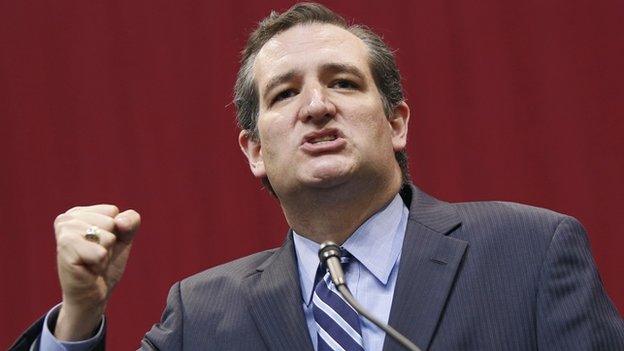Five things to watch in the new Congress
- Published
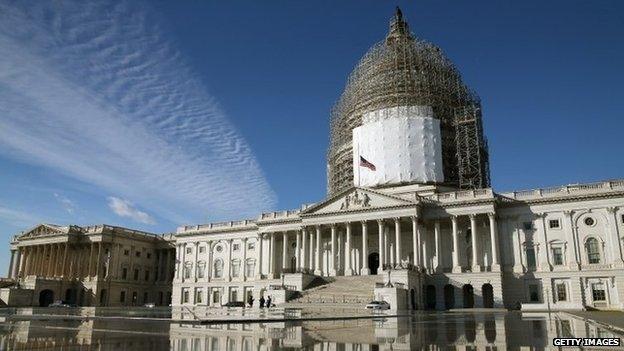
The US Congress is scheduled to convene on Tuesday, with Republicans formally taking control of both the House of Representatives and the Senate. What are the issues expected to make headlines in the coming months?
1. Keystone XL
One of the first items on the Republican agenda is the approval of a long-sought pipeline extension to bring more crude oil to refineries on the Gulf coast.
The legislation was the first bill to be introduced in Congress on Tuesday.
The project has been mired in politics and a state department review for years. Republicans and the project's several Democratic supporters say it will create jobs and further reduce North American reliance on foreign oil from other countries. Opposition has focused on the environmental impact of the project.
A similar bill failed late last year, but it is unclear if supporters, even with a Republican majority, have enough votes to overcome a veto on the legislation by President Barack Obama.
On Tuesday, the White House said Mr Obama would use a veto if it passed both chambers. Spokesman Josh Earnest said earlier the president believed the project would have little impact on already lower petrol prices.


2. Healthcare
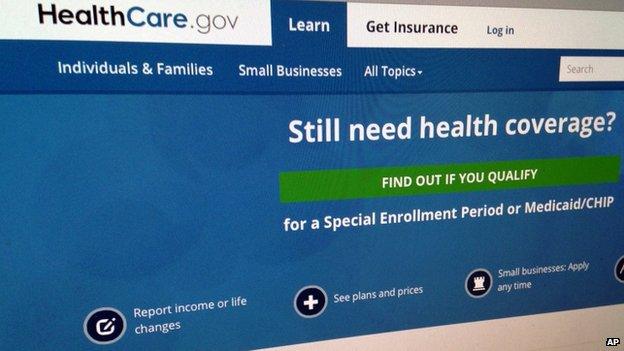
Mr Obama's healthcare law faces a hostile Congress and a Supreme Court challenge
On Mr Obama's agenda in his remaining time in office is ensuring Republicans do not defund the 2010 Patient Protection and Affordable Care Act.
Considered the largest overhaul of the US healthcare system since the 1960s, the law aims to extend health insurance coverage to some of the estimated 15% of the US population who lack it.
To achieve this, the law requires all Americans to have health insurance, and requires businesses with more than 50 full-time employees to offer health coverage.
Republicans, meanwhile, have labelled the law a "job killer", saying it is an unwarranted intrusion into the affairs of private businesses and individuals.
Conservatives are said to be focusing on a replacement plan in response to an upcoming Supreme Court decision on the legality of subsidies under the healthcare law, which could ultimately cut off access for millions of people.
The case - expected to be decided in June - may spur Republicans to focus on the matter sooner than the 2016 presidential campaign.

3. Immigration
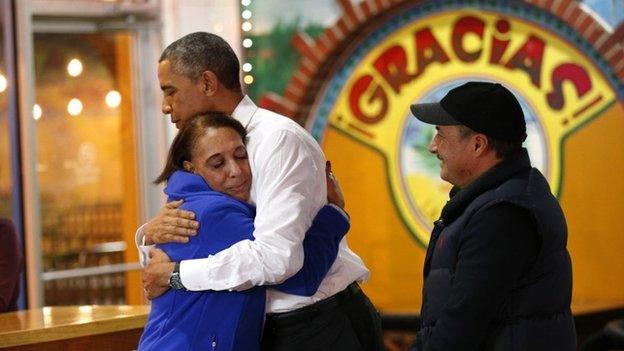
Barack Obama hugs a restaurant owner after speaking on immigration in Tennessee
In November, Mr Obama used his executive power to begin reforms to US immigration policy, including allowing more than four million illegally-arrived immigrants in the US to apply for work permits.
Republicans called the move an illegal overreach of his power and have vowed to roll back changes.
In Congress, they plan to try to force Mr Obama's to undo those changes over the funding for the Department of Homeland Security (DHS), the part of the government which includes the border security agency, and which runs out by the end of February.
The party faces an uphill political battle in using the entire DHS as a bargaining chip. says John Hudak, a fellow in governance studies at the Brookings Institution.
"It's motivated both out of politics and policy," he says. "But it does set up a very difficult political battle to win. If you're holding up funding for energy department or the labour department - it's not as bad as holding up money for the homeland."
Barack Obama: "Our immigration system is broken and everybody knows it"

4. Power of the pen
With both chambers of Congress controlled by Republicans, Mr Obama has warned he will use his authority to veto legislation he does not support in his final two years in office, including on healthcare and the environment.
Ramesh Ponnuru, a visiting fellow at American Enterprise Institute and a senior editor at National Review, says he thinks commentators are overestimating the numbers of expected vetoes in the next two years.
Because Democrats can still filibuster legislation to stop it from coming to a vote, any legislation that makes it to the president's desk will either have some bipartisan support or go through a reconciliation process - which is limited in its use.
"Most of it is going to die because of the filibuster," he says.
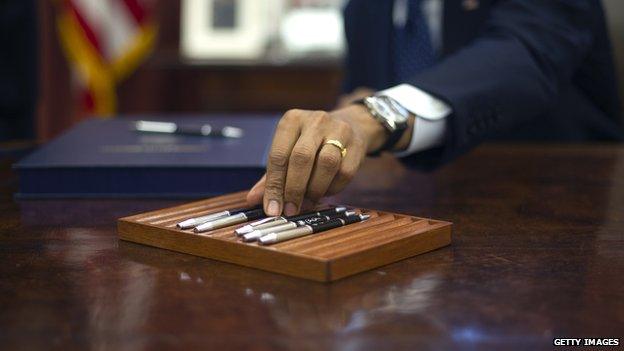
Historically, filibusters in a polarised Congress have been "extremely effective in reducing the number of presidential vetoes," Mr Hudak says.
"It has really prevented presidents from facing uncomfortable decisions."
Legislation that could end with a veto includes the approval of the Keystone XL pipeline project, any repeal or reduced funding for Mr Obama's healthcare law and legislation that targets environmental regulations made by the Obama administration.
But if there is something that gains Mr Obama's veto, it is unlikely to gain the two-thirds majority from both chambers needed to override the president's action.
"If it passed with significant bipartisan force and he vetoes, it politically isolates him," Mr Ponnuru said. "That's not helpful to his party or his party's nominee for president."

5. A leadership challenge
Republican John Boehner was first sworn in as Speaker of the House in 2011, and won another term on Tuesday. But he had some competition for the top spot in recent days, with Tea Party conservative Congressman Louie Gohmert throwing his hat into the ring.
Several House members said they would not stand behind Mr Boehner after he ushered through a $1tn (£660bn) spending package in December to avoid another government shutdown.
They are upset it did not, for example, include measures to defund his embattled signature healthcare law, nicknamed Obamacare.
"Republicans gave away the best tool available to rein in our liberal activist president - the power of the purse," said Republican Congressman Jim Bridenstine, one of the representatives who said they would not back Mr Boehner for House speaker.
In the end, 25 Republicans voted against Mr Boehner by casting their ballots for another candidate or simply voting present.
Reporting by Debbie Siegelbaum and Taylor Brown
- Published21 January 2021

- Published21 November 2014
